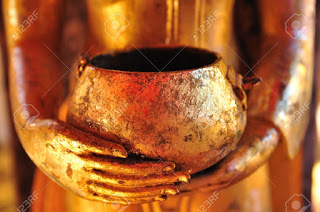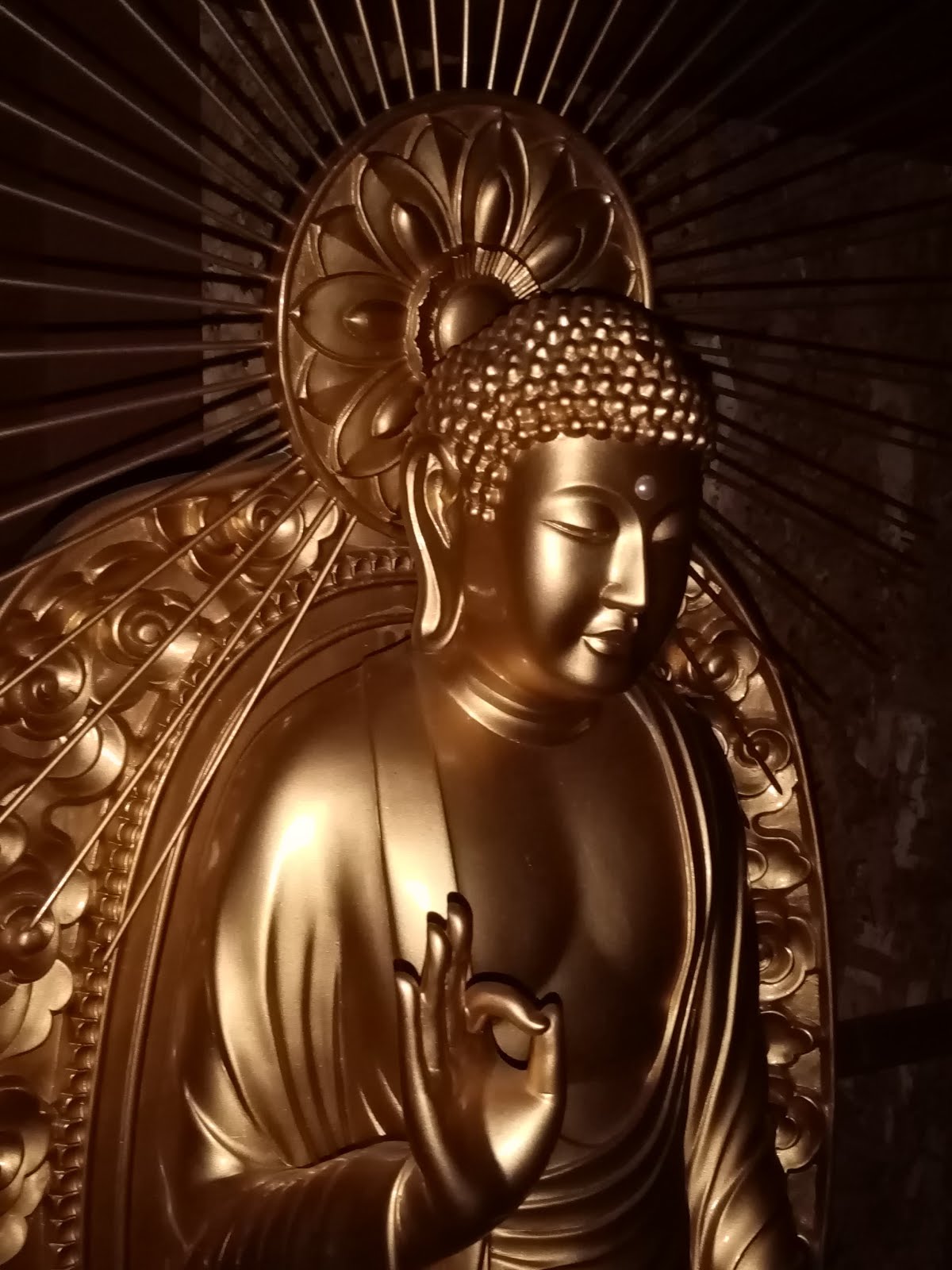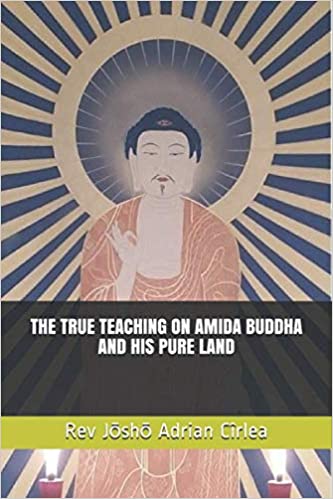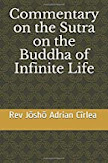“I wish to say to all aspirants for birth: I will now present a parable for the practicers in order to protect their Faith and to guard it against attacks by those who have wrong, perverted and unauthentic views. What is the parable? Suppose a man is traveling a hundred thousand li toward the west. On the way, he suddenly comes upon two rivers: one is a river of fire that extends southward, and the other is a river of water that extends northward. The two rivers are each a hundred paces wide and unfathomably deep, extending endlessly to the north and south. Where they meet, there is a white path, four or five inches wide. This path is a hundred paces long from the east bank to the west. The waves of the water splash and the flames of the fire burn the path. The waves and flames alternate without ceasing.
This traveler has already journeyed far into the open plain where there is no one to be found. Suddenly, there appear many bandits and vicious beasts. Seeing him alone, they approach competing with each other to kill him. Afraid of death, he at once runs to the west. When he suddenly sees this great river, he says to himself, "This river extends endlessly to the south and to the north. I see a white path in the middle, but it is extremely narrow. Although the two banks are close to each other, how can I get across? Undoubtedly, I shall die this day. When I turn round to return, I see bandits and vicious beasts coming closer and closer. If I try to run toward the south or north, I see vicious beasts and poisonous insects vie with each other to attack me. If I seek the path to the west, I will certainly fall into one of the two rivers of water and fire. His horror at this moment is beyond expression. So he thinks to himself, "If I turn back now, I shall die; if I stay, I shall die; if I go forward, I shall die, too. Since I cannot escape death in any way, I would rather follow this path. Because there is a path, it must be possible to cross the rivers."
When this thought occurs to him, he suddenly hears a voice from the eastern bank urging him, "Take this path with firm resolution. There is no danger of death. If you stay there, you will die." Again, he hears another voice from the western bank calling to him, "Come at once single-heartedly with right mindfulness. I will protect you. Do not fear that you may fall into the calamities of water or fire." Since the traveler hears this voice urging him from the bank and the calling from the other, he resolutely, body and soul, takes the path and proceeds at once without doubt or apprehension. As he takes a step or two, he hears the voices of the bandits on the eastern bank, "Come back! That path is treacherous. You cannot cross it. Undoubtedly, you are sure to die. We have no evil intentions in pursuing you." Though hearing the calling voices, this person does not even look back. As he proceeds straight on this path with singleness of heart, he, in no time, reaches the western bank and is now free from all danger. There he meets his good friend, and his joy knows no end.”
Commentary:
This traveler who wanders in “the open plain where there is no one to be found” represents us, mere travelers through the vanity of this life and having no chance of meeting with a good spiritual teacher.
The road is long and difficult and suddenly we are in front of the two rivers of fire and water. Water represents greed and thirst or blind desires and fire represents hate and anger. In fact, the traveler does not stand in front of the two rivers thinking calmly wether to take the decision to to go forth or not, but is submerged to his neck in his passions. His situation is desperate. Bandits and ferocious beasts saw him and are trying to reach him and kill him. While pretending to be his friends they are in fact his passions and illusions. There is no other way for him than to accept Amida's salvation.
The traveler is terrified and has no hope of escape. From behind, from left and right, the dangers are all the more serious. The rivers lies infinitely because without end is his passions, illusions, hate and greed. A white path is behind him but its narrow and is continuously splashed by the water and fire of the two rivers. He doubts, he does not believe that he will survive even if he follows this path, but he decides: “since I cannot escape death in any way, I would rather follow this path. Because there is a path, it must be possible to cross the rivers." He thinks to face everything through personal power, acting from by the courage of the desperate man. “I have no other option, I have to go forward, I have to confront my fear, I have to make an effort”.
In that moment something exceptional happens. He hears a voice from the Eastern shore. It is the voice of Shakyamuni Buddha who urges him to go forward. This means that he listens to Amida Dharma as taught by Shakyamuni. Then, he hears a calling from the West; it is Amida Buddha who tells him: “Come right now!” Everything is very dramatic and full of tension, the danger of death is very close, and the calling of Amida is not a usual one, but hurried and intense. In fact he says: “I beg you, come now, come immediately, there is no time!” There is no requirement or precondition in his calling just to come immediately and with all his trust, this is what is meant by “single-heartedly with right mindfulness”
The parable says: “Since the traveler hears this voice urging him from the bank and the calling from the other, he resolutely, body and soul, takes the path and proceeds at once without doubt or apprehension.” This is the moment of the Awakening of Faith in the Primal Vow of Amida Buddha, that is the realization of shinjin or “the entrusting heart”. The traveler “hears” the calling of the Buddha and has no doubt. It is not a simple hearing in the common sense of the word, it implies the understanding and the acceptance of the salvation method offered by Amida, which is the Vow of salvation through nembutsu. We notice how the mental state of the traveler changes radically after this acceptance. While he could hardly take the decision before because he had no other option, to follow the white path, now he appears before our eyes as a determined man, ready to listen with all his mind and body the benevolent calling and to rely on it. Nothing can influence him anymore. The bandits from behind him cry out to him and try to convince him to turn back, but he no longer gives them any attention: “though hearing the calling voices, this person does not even look back”. The traversing of the path takes place “in no time”, that is easy. The flames and waves that splash the path are not mentioned again after the moment in which the traveler attains complete entrusting in the Buddha. No internal or external condition can hinder his way. He is in what is called “the non-retrogresive stage” He cannot fall back and he cannot be deluded by those with different understanding, who have wrong views or follow other practices.
All happens soft and easy because now he is no longer carried by his personal will but by the power of nembutsu. It is stated in Tannisho: “No evil can obstruct the working of the Primal Vow of Amida.” Personal karma, whether good or bad, has no more effect.
When he reaches the Western bank “he meets his good friend, and his joy knows no end”. This means the attainment of Perfect Enlightenment, Nirvana, meeting and unity with Amida Buddha. The joy which knows no end indicates “birthless birth”, that is the end of suffering as a being condemned to birth and death.
Rev. Sakakibara said:
“The white path is the path of Namo Amida Butsu with a width of four or five inches. This apparently narrow and fragile path was laid by Amida from that shore of Enlightenment to this shore of illusion.
I often say to people that Amida actually labored to make this path by himself, hammering piles into the ground and carrying rocks and dirt. And, furthermore, he is loudly calling on us to come. So when we begin to say Namo Amida Butsu, we are already on the path laid by Amida. All that is left to us is to become aware of this. Instead of always looking down at our feet, we should look forward. Then, we will be sure to go over to that shore thanks to Amida’s power. That path is already laid down for us. Everything has already been taken care of, with Amida footing the bill.
I just mentioned that Amida carried the rocks and dirt himself to build the white path. However, our bonno (blind passions) are not the material for the path, but the condition for building it. Without bonno, we would not need the nembutsu.”


























0 comentarii:
Post a Comment